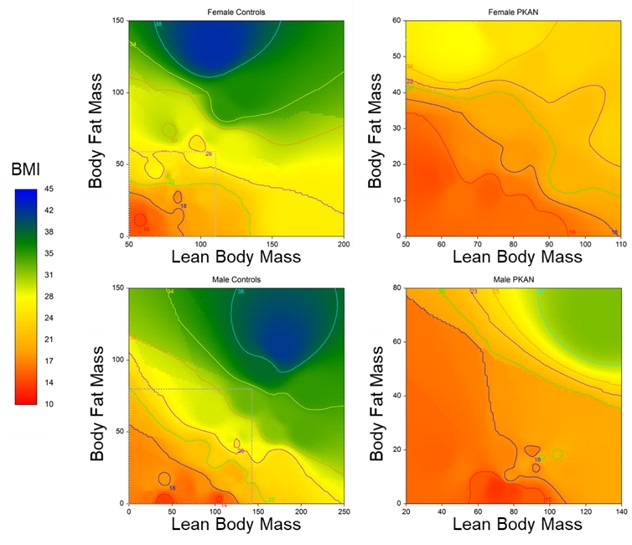Category: Rare Genetic and Metabolic Diseases
Objective: Applying segmental bioimpedance testing to assess peripheral metabolic alterations in PKAN.
Background: PKAN is a rare autosomal recessive disorder with >50 different mutations in PANK2. PANK2 is critical for coenzyme A production, contributing significantly to brain and peripheral lipid metabolism. Previous attempts to assess differences in peripheral metabolic indices were limited by the use of subjects with different mutations, simple composition measures, without controlling overall differences in body weight, height, gender, and age.
Method: We measured whole body bioelectric impedance and composition analysis with the S10 (InBody) device in Dominican PKAN subjects (c.680A>G, n=38), and population-based Dominican controls (n=61). Subjects were tested in a supine position wearing electrodes on fingers and ankles, with >80 different measures of impedance, reactance and body composition for all body regions. Data was subjected to principal component analysis (PCA) to reduce complexity prior to analysis using a multivariate analysis of variance (MANOVA) with Diagnosis and Gender as main effects of interest. Next we performed a generalized linear model analysis of covariance (GLM-ANCOVA) to evaluate Diagnosis effects while covarying for differences in Age, Gender, Height and Weight (Bonferroni adjustment for multiple testing).
Results: The MANOVA revealed a highly robust overall effect of Diagnosis [Wilk’s Lambda and Roy’s Root (F33,63 = 3.58, p=7e-6)], with significant (p<0.0015) differences in 16 of 33 variables, including Weight, Intracellular Water, Total Body Water, Body Fat Mass, Lean Body Mass, and BMI among others. A few variables exhibited effects due to Gender after multiple testing correction, including %Body Fat. The GLM-ANCOVA further suggested that 5 kHz reactance was markedly affected (decreased) in PKAN subjects after controlling for Gender, Age, Height and Weight (F1,93=17.1, p=7.6e-6), suggesting a shift toward greater relative muscle mass in PKAN (despite muscle wasting), which could contribute to or reflect their dystonic state.
Conclusion: There are widespread metabolic and body composition differences, with some of these influenced by Gender (Figure 1). Global wasting may be occurring as a cause and/or consequence; simple body fat or muscle mass measurements are insufficient to draw conclusions. Difference in body fat between sexes may suggest possible estrogen mitigation.
To cite this abstract in AMA style:
C. Bass, F. Middleton, C. Muniz, A. Espinoza, M. Santana Jimenez, S. Baser. PKAN is associated with significant peripheral metabolic alterations in the Dominican Republic cohort [abstract]. Mov Disord. 2020; 35 (suppl 1). https://www.mdsabstracts.org/abstract/pkan-is-associated-with-significant-peripheral-metabolic-alterations-in-the-dominican-republic-cohort/. Accessed November 17, 2025.« Back to MDS Virtual Congress 2020
MDS Abstracts - https://www.mdsabstracts.org/abstract/pkan-is-associated-with-significant-peripheral-metabolic-alterations-in-the-dominican-republic-cohort/

